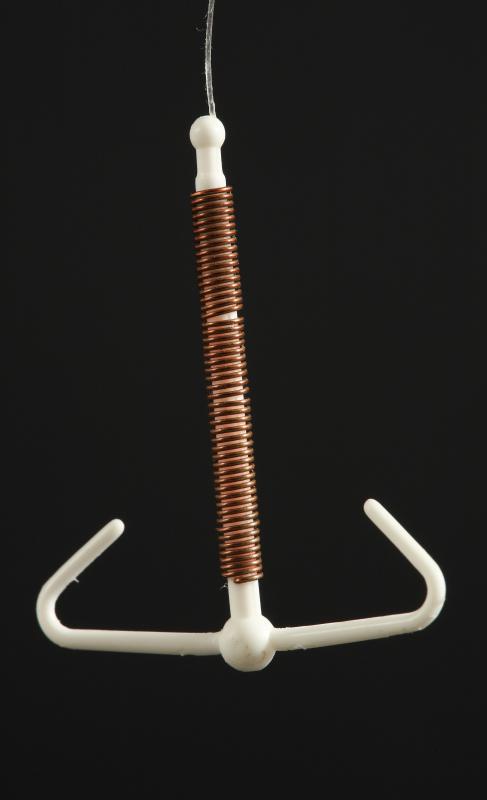At WiseGEEK, we're committed to delivering accurate, trustworthy information. Our expert-authored content is rigorously fact-checked and sourced from credible authorities. Discover how we uphold the highest standards in providing you with reliable knowledge.
How Common is IUD Pain?
One of the many birth control options available to women today is the intrauterine device (IUD), which is available in both hormonal and non-hormonal varieties. When placed inside the uterus, an IUD can prevent pregnancy for up to 10 years, depending on the type. As with any other medical device, IUD side effects are possible, the frequency of which varies by type. One of the most common side effects is IUD pain, which includes pain during or immediately after insertion only as well more intense menstrual cramps, or dysmenorrhea. In general, nearly all women will experience IUD pain during the insertion and for a variable period of time afterward, and anywhere from four to 15 percent of women may experience ongoing dysmenorrhea that warrants IUD removal.
IUD pain during insertion is typically mild. Many doctors advise their patients to take an over-the-counter pain medication such as ibuprofen 30 minutes before the procedure, in order to minimize this pain. Other methods of controlling IUD pain during insertion include local anesthetic injections and scheduling insertion during the menstrual period, when the cervix is slightly open. In the case of a very tightly closed cervix, it may be necessary to apply medications to soften the cervix prior to insertion, making the process both easier for the physician and less painful for the patient.

After insertion, the body must adjust to having an IUD in place. During this time, patients typically experience dull pain similar to menstrual cramps. In most patients, this IUD pain only lasts a few days and is easily treated with ibuprofen. Some women may have this pain for up to six months. Women should tell their doctors about any severe cramping they experience while not menstruating, as well as any IUD pain accompanied by other symptoms such as unusual vaginal discharge, chills, or nausea. These symptoms may not be signs of a simple IUD side effect, but may indicate the presence of an infection.

Women may also have an increase in menstrual cramps after getting an IUD. In patients with hormonal IUDs, this increase in pain is generally temporary, with many women experiencing a decrease in both menstrual pain and flow after approximately three months. Non-hormonal IUDs may cause an ongoing increase in menstrual cramps, even if the patient never had painful periods before. Painful menstruation caused by IUD use is known as secondary dysmenorrhea. In up to 15 percent of cases, this IUD pain is so severe that the patient elects to have the device removed.
AS FEATURED ON:
AS FEATURED ON:













Discussion Comments
I had mine put in about a week ago and am still having trouble with it. It was a horribly painful experience getting it done and I nearly fainted afterwards, although I can put a brave face on when need be. I ended up nearly crushing the support nurse's hand and was sweating all over the shop from the pain and alien rooting feeling in such a delicate part of me.
I was in agony for 24 hours with what seemed to be similar to labor pains from what I've read; they said it'd feel a bit like period pain but I've had period pain and my God, it was like no period I've ever had. I was worried my body was trying to reject it, because it really did take my breath away. I felt awful after realizing what a totally barbaric thing I had just been through. I think my doctor may not have been the most experienced, maybe. I have been in pain and discomfort since really.
I'm terrified it's perforated my uterus, since I now know it can. I should have looked into it more first, but really didn't want to take hormones again and went from the advice of my best friend who has had a good experience with it.
I also made the stupid mistake of not having my boyfriend or anyone with me when I went for insertion! Even though I was obviously in a state of shock from the whole thing, I was ushered out and felt I should have been given a bit more time and reassurance. It hurt so much I was convinced something had gone wrong, but the doc looked at me like I had two heads when I was panicking about the fact that something might be seriously wrong and I now know that is very possible! I should not have been ignored like that but yes, it depends on who does it too, I guess.
It's been a week and it is very still uncomfortable. I'm still cramping and uncomfortable during sex and the strings are stabbing my boyfriend when we have intercourse, which I see now is common, even though they say you're not meant to feel it.
I have felt to see if I could feel any of the actual device but can only feel the strings thankfully, like I'm supposed to. I'm going to book to get it out soon. It certainly isn't right for me. I suffer from anxiety also so it has caused me quite a bit of distress. The sensation of it is very disturbing, to be honest. I can actually feel it moving round in my uterus. I wish I hadn't put myself through it. I know a lot of women have different experiences with it. My best mate loves hers, but she has had kids so I think hers is much less painful.
Lucky for those who don't have problems and nice one that you have found something that works for you, but if you're researching this, be warned from my knowledge and research. I have found out it is a very unpleasant form of contraception and frankly, I am dreading them rooting round in there again, but I just want it out of my body.
Sorry if this sounds a bit scary, but I can only be honest and only wish I'd bothered reading more of these posts. I advise against it, but again, you never know until you try. I wish you all the best whatever you decide, ladies.
Post your comments